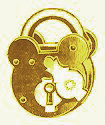JOSIAH PARKES & SONS LTD, UNION WORKS, WILLENHALL
The Parkes family were originally from Gornal. The
eldest brothers, William (born 1822) and Richard both served
apprenticeships as locksmiths in Willenhall. Josiah Parkes (born
1824) was apprenticed to Hickmanís Iron Works in Bilston.
It seems that the three brothers set up in the
ironmongery trade about 1840 in premises at 28, 29 and 30
Doctorís Piece. It seems that Josiah continued to work at
Hickmanís, only helping the firm in the evenings.
The trade done in those days
was considerable, as iron at the time was the material most commonly
used by lock and key makers throughout the land. The business grew
in volume and scope and new premises were taken in Union Street.
Old catalogues show that merchanting was done in iron and a great
variety of general goods, from mole traps to clothes' horses, from ash
pans to carpentersí tool baskets .... and locks.
Richard did not stay with the firm but it is not known
when he left. William had an ironmongery business at 9 Union
Street. About 1850 Josiah and his wife, Catherine, moved to
premises at 3, Union Street and Josiah began working full-time with
Richard in the ironmongers.
By 1851 William and Josiah were in partnership and were advertising in
the local papers and trade journals as William and Josiah Parkes,
Iron, Steel and Wire Merchants, Union Street. The partnership made
locks and other hardware but they also traded in those goods, acting as
factors. They would supply the raw materials to other locksmiths
and buy back the finished products from them, selling them on to
wholesalers and retailers.
The brothers were obviously successful in this trade and in the
1850s were able to take on three apprentices. More tellingly they
acquired new premises in Union Street in 1852 and opposite in Wood
Street in 1883.
In the 1860s the Parkes brothers began to concentrate more on
manufacturing and merchanting locks. An advertisement in the
Wolverhampton Guide of 1864 described them as "general merchants
and manufacturers of all kinds of rim, mortice, pad locks, bolts and
latches".
In 1861 the brothers were able to move their families to
better premises. William and his wife, Elizabeth, and
their four children, moved to 78 Union Street. Josiah
and his wife and five children moved to 77 Union St. The iron
warehouse and shop lay between the two houses.
The original business was dissolved in 1868 when his
son, William Edmund, joined Josiah. In 1885 James Harry, another
son of Josiah, joined the firm, when it became Josiah Parkes and Sons.
As the business grew the Parkes children came into the
Company. William had three sons: Samuel, Josiah and William Fletcher,
who all joined as iron merchants clerks. Josiah Parkes had five
sons, who were all younger than their cousins. Friction developed
between the two families about who was going to control the
business. To resolve the problem William and Josiah dissolved the
partnership around 1873 and set up two separate businesses.
William and his sons became Parkes, Parkes and Co. but soon both
Samuel and Josiah started other businesses, Samuel as a hardware
merchant in New Road and Josiah as a brass founder in Wood Street.
Josiah set up a company with one of his sons, William Edmund
(1855-1920), trading as iron merchants and hardware factors. They moved
into 28 Doctorís Piece. William Edmund concentrated on the hardware
section and Josiah looked after the iron merchanting. By 1880
business was doing well enough for them to employ three men and expand
the premises to 18, 29 & 30 Doctorís Piece. Advertisements
from 1884 refer to Josiah Parkes and Sons as "bolt, nut, screw,
hinge, latch and lock furniture manufacturers". Josiah Parkes
Junior and John Parkes both joined the firm.
In 1887 Josiah Parkes Senior retired (Josiah died, aged 76, in August
1899 and was buried in the churchyard at Little London Baptist Church)
and in January 1888 a new partnership under the same name was
established between William Edmund, John and James Harry Parkes. Josiah
Parkes Jnr did not join this firm but carried on the iron merchanting
business by himself. The youngest son, Ebeneezer Thomas decided to go
into a career in banking. In 1889 the other brothers decided to
concentrate their firmís attention on the manufacture of locks and
gradually ceased trading in iron and other goods. When more
factories for lock making appeared, as the lock industry grew in size
and importance, Josiah Parkes and his sons recognised the trend,
discontinued iron trading in 1896 and took up the manufacture of locks.
The enterprise began in quite a small way and gathered pace in later
years.
On their first products that they manufactured, the company stamped
the image of a hose coupling - a product that they also made - and
this image became the trade mark of Josiah Parkes even when they stopped
hardware trading.
There was a lot of foreign competition in hardware goods
and iron products in the 1880s and 1890s. Despite this Josiah Parkes and
Sons were successful and they provided goods to shops and businesses all
over the country. But the Union Street business of Parkes, Parkes
& Co. faded out, as did the Samuel Parkesí business. Josiah
Parkes and Sons were able to buy the old Union Street property and
sold the Doctorís Piece property in 1890.
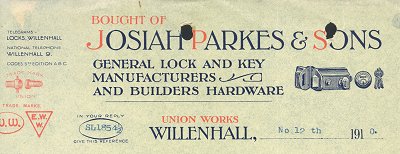 |
A letterhead from 1910,
showing three trade marks and still claiming to be in builders'
hardware. |
| The 1910 letterhead above
shows three trade marks: the hose coupling; WW in an oval; and EWW in a triangle.
The hose coupling was their main mark in their earlier days, reflecting their
early trade in hardware.
The entry from a trade mark listing
(supplied by Trevor Dowson) also shows two versions of the word
"union", which became their usual trade mark.
|
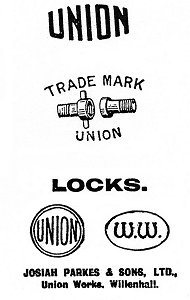
|
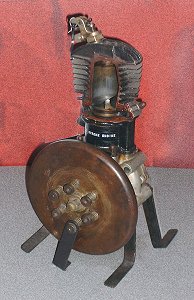 |
This engine, exhibited at
the Black Country Living Museum, was made by Josiah Parkes and
Sons Ltd. |
William Cyril Parkes, elder son of William Edmund Parkes, joined the
family business in 1903. In 1911 Harry George Parkes, son of James
Henry Parkes, joined and his younger brother, Arthur Joseph, joined in
1919.
In 1906 their employees totalled 35 but by 1913 they had
increased to 100. (In 1934 there were 550, the 1948 figure was
900, in 1958 it had reached 1300 and by 1971 it was over 1800, despite
increase mechanisation.)
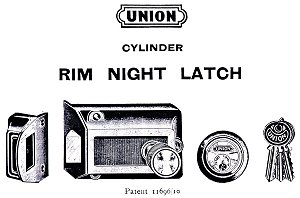 |
An important step was taken in 1911 company began the manufacture of
cylinder locks and latches started. At the time comparatively few
were being made in this country. |
In 1913 the company was able to expand and build a new
lock shop adjoining the original Union Street premises.
Just prior to the first World War the locksmiths union
had managed to establish itself and in negotiations with the Lock
Manufacturers Association (of which Josiah Parkes were members) had set
new wage levels:
Boys aged 16-17
3d per hour
Boys aged 17-18
4d per hour
Boys aged 18-19
5d per hour
Boys aged 19-21
6d per hour
Over 21
7d per hour
At the beginning of the war trade was depressed due to few government
contracts and the decrease in exports. But in due course the factory was
turned over to the production of munitions.
In 1916 Josiah Parkes & Sons was formed into a limited company with
a share capital of £25000. The company was incorporated on 13
December 1916 with William Edmund Parkes as Chairman and Managing
Director and William Cyril Parkes as assistant Managing Director. With
the death of his father in 1920, William Cyril Parkes became Chairman
and joint Managing Director with his brother, Arthur Josiah Parkes.
By 1917 so many men had enlisted that Parkes like most other
manufacturers in the area, had to employ women workers. When the
war ended the women did not automatically lose their employment.
Conditions were not easy for women employees - they were not allowed to
speak at work and had to meet together to walk home at the end of the
day, to avoid attracting menís attention.
In the 1930ís the Union Street premises in Willenhall were modernised
and a new office block was completed in 1933.
| An architect's drawing of the proposed new offices
in Gower Street, built in 1933. |
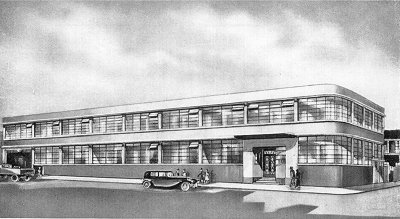
|
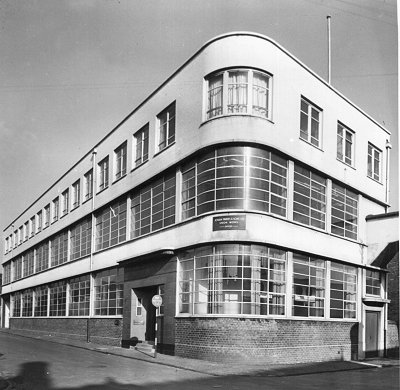 |
The new offices as built in 1933. |
| The Union Works, on the corner of Gower Street and
Union Street, built as an extension to the existing works, and in
a style matching the new office building. |
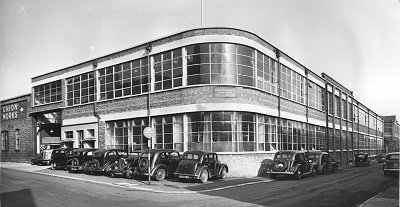
|
The company was converted into a public company under the name of
Josiah Parkes & Sons Ltd, in 28th November 1936, taking
over J. P. and Sons (Holdings) Ltd (formerly Josiah Parkes & Sons
Ltd). The directors were C. W. Parkes (Chairman and joint MD), A.
J. Parkes (joint MD), W. E. Egar (Secretary) (Stock Exchange Yearbook
1946). The new company had a paid up share capital of £200,000.
In the Second World War (as in the First) the skill and machinery of
the company were put to essential munitions manufacture, notably
grenades, fuses for shells, detonators, etc. as well as locks to secure
the spinners of aeroplanes and thousands of padlocks to secure kit bags
and numerous other purposes.
In 1945 work began on building a new factory, covering 150,000 square
feet, on spare land at the Companyís Sports Ground situated half a
mile from the Union Street Works. This land at Portobello had first been
rented in 1921 and the freehold acquired, with a view to building a new
factory, in 1935. The factory started producing lock parts in 1946.
View some photographs
of the works interior |

|
Josiah Parkes & Sons Ltd had built up a thriving export business
over the years. In 1928 Cyril William had toured Australia, New
Zealand and Canada to explore the possibilities of expansion. By the
late1940s there were representatives and agents in over 50 countries
worldwide. In 1948 Josiah Parkes & Sons (South Africa) Ltd. was
formed with W F Boustred as Chairman, for the purpose of manufacturing
Union locks and architectural furniture in South Africa. The factory was
based at Fordsburg, Johannesburg. In the 1960s Josiah Parkes & Sons
Rhodesia Ltd and Josiah Parkes & Sons Nigeria Ltd. were formed. Two
further factories were established in Singapore and Kenya to manufacture
and assemble Union products in their respective countries.
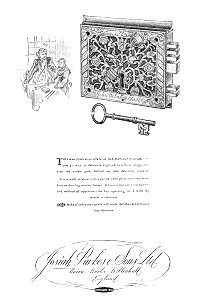 |
This advert, from the
Ironmongers Guide 1950, is emphasising quality and
tradition. Under their name are the words
"Established 1840". The text says that the lock
was made about 1770 and was in the company's museum. The
inscription on the lock says "John Webar fecit". |
In 1956, the old established business of Edwin Showell & Sons of
Stirchley, Birmingham, was acquired. Showells was founded around
1830 and manufactured door springs and architectural brass ware. The
principal object of the amalgamation was to enable Parkes to offer
builders merchants, the architects and the building trade a
comprehensive range of builders hardware.
In 1964 Cyril Parkes retired as chairman and was succeeded by his
brother Arthur who himself retired in 1967.
The company was acquired by the Chubb Group of security companies in
1965 and became a member of the Racal Group of companies in 1984 on the
acquisition of Chubb & Son plc by Racal Electronics plc.
In 1977 the companyís excellent record in the export trade was
rewarded by their becoming the first lock manufacturer to be honoured by
the Queenís Award for Export Achievements.
The company was acquired, along with Chubb Locks, by Williams
Holdings 1997. In October 1997 Williamís Holdings announced
changes to the organisation of their Security Products Group. They
planned to close the Union factory in Wood Street, the Yale factory in
Temple Bar (this was the Yale Die Casting Division on the site of the
old Enoch Tonks factory, and had been due for closure before the Williamís
take over). They also closed the Planetary Road Warehouse, which
had been used as a warehouse following the move of Chubb Lock making to
Portobello; this was the old Albert Marston factory. The Yale Wood
Street site was planned to become the company headquarters and
manufacturing unit for all cylinder and padlocks locks. The Parkes
Portobello site would concentrate on all mortice production and become
the sole distribution site. The proposals would create 240
redundancies over the next 15 months. (E&S 9-10/10/97).
The change over to produce all cylinder locks and padlocks at Wood
Street took place in May 1998 . The production of the Union
Cylinder locks ceased and all locks were made to the Yale design but
were marked both Yale and Union. The move to produce all mortice
locks at the Portobello site was completed in July 1998, when they
ceased to make Yale mortice locks and only made the Union range,
although they were sold branded Yale and Ingersoll.
At this point (April 1999) the whole of the Williams Group lockmaking
side was reorganised under the name Yale Security Products UK Ltd,
with offices in Wood Street, Willenhall. All the administration,
sales and purchasing etc. took place from there.
Early in 2000 it was announced that Williams were selling this
division off to Assa-Abloy, a Swedish lockmaking company. The
official take over did not take place until the end of August 2000.
For further information on this company after the Assa
Abloy takeover, see the entry for Chubb.
references:
Walsall Archives note on the history of Parkes, prepared by them from
reports received from the company in 1994
Catalogues and brochures issued by the company, and a photo
collection, all in the Lock Museum, Willenhall (undated but about 1950s
and 1960s)
We are grateful to Yale Security Products for permission to reproduce
images which are still in their copyright.
|
